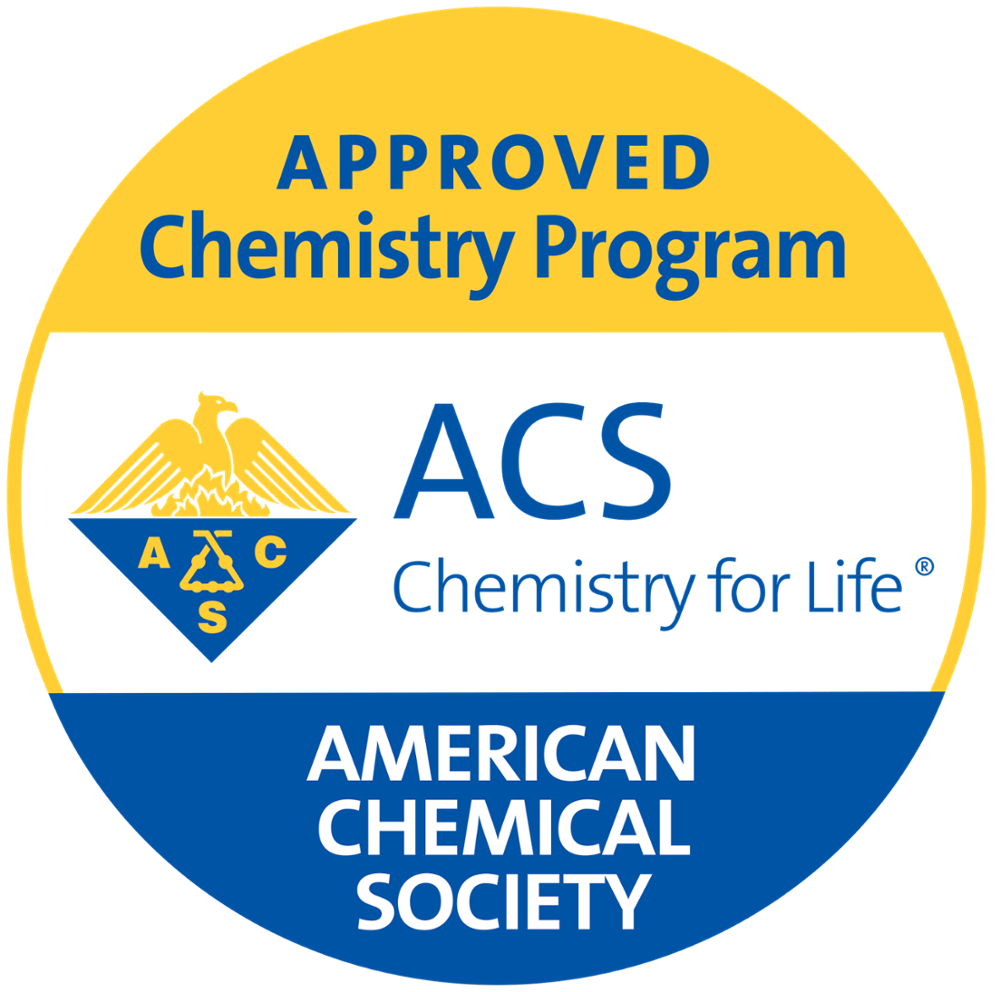BS Major Requirements

The BS program is designed primarily for students who anticipate professional careers in chemistry and related science. The program provides the range of knowledge, skills, and experience required for work as a professional chemist or for entry into graduate studies in chemistry.
The fundamental work is completed by the end of the third year, leaving the senior year free for graduate-level coursework and a full year of independent research with one of the department’s faculty.
Our BS program meets all of the requirements for an American Chemical Society (ACS) approved degree.
Students should speak with a chemistry advisor to tailor their programs specifically to their career goals. Students normally declare their major sometime in their sophomore year.
While the required courses leading to a BS in chemistry may be scheduled with some flexibility (e.g., the mathematics and physics courses), the following program of studies are suggested:
NOTE: We have recently changed the CHEM 234 substitution policy and have not yet updated the checklists. Refer to the text below for the lastest policy regarding CHEM 23x substitutions.
BS Degree Requirements
Student are required to take at least 55 credit-hours in chemistry, and at least 85 credit-hours overall. We require students to maintain at least a 2.0 grade point average (GPA) in the major, excluding allied field courses.
General and Organic Chemistry Sequences (16-21 credits)
General Standard Sequence
- CHEM 131: Chemical Concepts I (or equivalent AP credit)
- CHEM 132: Chemical Concepts II
- CHEM 203: Organic Chemistry I
- CHEM 204: Organic Chemistry II
- CHEM 207: Organic Chemistry Lab I (1 credit)
- CHEM 210W: Organic Chemistry Lab II (2 credits)
First-year Organic Sequence
- CHEM 131: Chemical Concepts I (or equivalent AP credit)
- CHEM 171: First-year Organic Chemistry I
- CHEM 172: First-year Organic Chemistry II
- CHEM 173: First-Year Organic Chemistry Lab I (1 credit)
- CHEM 210W: Organic Chemistry Lab II (2 credits)
Theory Courses (16 credits)
- CHEM 211: Inorganic Chemistry
- CHEM 251: Physical Chemistry I
- CHEM 252: Physical Chemistry II
- CHEM 262/BIOL 250/BIOL 252: Biochemistry
Upper-Level Laboratory Courses (12 credits)
Both of the core laboratory courses:
- CHEM 231: Chemical Instrumentation
- CHEM 234: Advanced Laboratory Techniques
One physical chemistry lab course:
- CHEM 232: Molecular Spectroscopy
OR - CHEM 244: Adv. Nuclear Science (ANSEL)
*CHEM 231, 232, or 244 may be replaced by an upper-level laboratory course from another department that maintains curricular coverage in the areas of analytical, physical and macromolecular/nanoscale chemistry required by the American Chemical Society.
400-Level/Graduate Level Chemistry Course (4 credits)
At least four credits of a 400-level chemistry course may be taken anytime during the junior or senior year.
Senior Research (8 credits)
- CHEM 393: Senior Thesis Research
Two semesters, equaling eight credit hours of Senior Research, are required for a BS degree. BS students must prepare a senior research thesis, and have the thesis read and approved by the research advisor and a second faculty member in chemistry.
Upper-Level Writing Requirement
All chemistry majors are required to complete two upper-level writing courses ("W" courses). At least one of these courses must be a chemistry department course selected from the following:
- CHEM 210W: Organic Chemistry Lab II (2 credits)
- CHEM 231W: Chemical Instrumentation Laboratory (4 credits)
- CHEM 232W: Molecular Spectroscopy Laboratory (4 credits)
- CHEM 234W: Advanced Laboratory Techniques (4 credits)
Student may select another course from above or a writing course from another department to fulfill the second writing course requirement.
Mathematics Coursework (16-20 credits)
One of the following sequences:
- MATH 141, MATH 142, and MATH 143 (Calculus I, II, and III)
- MATH 161 and MATH 162 (Calculus IA and IIA)
Plus one of the following courses:
- MATH 165: Linear Algebra and Differential Equations
- MATH 163: Ordinary Differential Equations
Plus one of the following courses:
- MATH 164: Multidimensional Calculus
- STAT 180: Introduction to Applied Statistical Methodology (formerly STAT 211: Applied Statistics for Social Sciences I)
- STAT 190: Introduction to Statistical Methodology (formerly STAT 212: Applied Statistics for The Biological And Physical Sciences I)
- STAT 201: Introduction to Probability
- CSC 161: Intro to Programming
- CSC 171: Intro to Computer Science
- Any 200-level mathematics course
Physics Coursework (8 credits)
One of the following sequences:
- PHYS 113–114 Sequence (General Physics I & II)
- PHYS 121–123 Sequence (Mechanics and Electricity & Magnetism) recommended*
- PHYS 141–142 the Honors Sequence of Mechanics and Electricity & Magnetism
*We recommend students take the PHYS 121–123 series. The sequence begins in the spring with PHYS 121.
Additional Suggestions
Please note that BIOL 204: Principles of Human Physiology cannot be used to fulfill chemistry major requirements.
Students who are interested in pursuing pre-med and allied health professions are advised to contact a health professions advisor at URhealthprofessions@rochester.edu.
Students who are interested in pursuing a double major or double degree are advised to consult the College website, which outlines the course overlap rules and additional credit requirements.
